All For Literacy
The All for Literacy podcast connects you with the voices, research, and practices transforming how we teach reading—because every student deserves instruction that works. Through monthly podcasts, hosted by Lexia’s Senior Education Advisor Kerri Larkin, this series forges connections between literacy research and educators’ knowledge and skills. This is a conversation that will have a real impact on teachers and students, with actionable information and research designed to support our goal of literacy for everyone.
All for Literacy brings together researchers, educators, and experts to elevate literacy in America and create real equity in the classroom.
Episodes

Tuesday Nov 19, 2024
Tuesday Nov 19, 2024
“When we were growing up, having good grades wasn't cool. What we're trying to do is make it cool today,” says David Wyatt about his commitment to driving educational change through his work with the South Carolina Football Hall of Fame and the South Carolina Top 10 by 2030 initiative.
A seasoned attorney, advisor, and community leader in South Carolina, Wyatt joins All For Literacy host Dr. Liz Brooke for Season 3, Episode 5, which was recorded live during The Reading League 2024 Conference. Wyatt and Brooke discuss empowering youth, making learning cool, and how educators can partner with community organizations to make change happen in their classrooms and districts.
Wyatt shares how he’s used the powerful influence of sports in his community to increase educational excellence and career readiness among students in his home state:
Find and partner with community organizations to support student success
Bring in influential mentors to inspire students to love learning
Cut through the noise and motivate students to commit to their education
Explore the resources mentioned in this episode in the show notes!

Tuesday Oct 22, 2024
Tuesday Oct 22, 2024
What steps should concerned parents take if they suspect their child is facing literacy struggles?
Meyer shares the strategies she has learned during her own advocacy journey, including:
The top five questions parents should ask at school
The surprising reasons students struggle to read
Outside-of-the-box solutions to improve literacy skills
How to be an effective advocate
Listen to Season 3, Episode 4, of All For Literacy and become empowered to create the change students and educators need to improve literacy rates, and subscribe to the podcast to never miss an episode.
See the episode breakdown & all mentioned links at All For Literacy today!
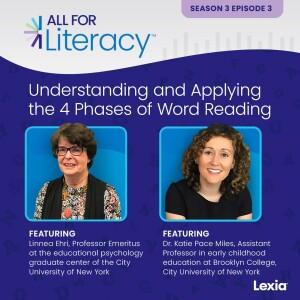
Tuesday Oct 01, 2024
Tuesday Oct 01, 2024
What is Alphabetic Phase Theory, and how can it help students develop their literacy skills?
Tune into Season 3, Episode 3 of All For Literacy for the answer as host Dr. Liz Brooke is joined by literacy research powerhouses Dr. Linnea Ehri and Dr. Katie Pace Miles. A distinguished professor emeritus at City University of New York, Dr. Ehri focused her research on the reading acquisition process. Dr. Miles, who earned her doctorate while studying with Dr. Ehri as a teacher, shares her expertise in continuing the implementation and application of Alphabetic Phase Theory.
Drs. Ehri and Miles share which foundational skills are most critical when learning to read, helping educators focus their classroom activities to support literacy studies. The pair also covers the research behind these skills in an easy-to-digest way, what questions to ask during an assessment to understand a student’s alphabetic knowledge, and the appropriate subsequent interventions.
Get an inside look into orthographic mapping—what it is and how to translate the research into practical classroom activities; evidence-backed interventions; and actionable advice to use the science of reading to enrich the lives of their students.
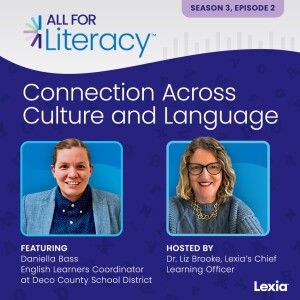
Tuesday Sep 03, 2024
Tuesday Sep 03, 2024
An English learners coordinator at DeKalb County School District in Georgia, Bass joined All For Literacy host Dr. Liz Brooke for Season 3, Episode 2. After working with refugees through various nonprofits and AmeriCorps, Bass earned her Masters of Arts in Teaching and has dedicated her career to supporting this population as they learn English.
Gain actionable insight into how to:
Build a sense of connection across a range of diverse backgrounds, and why this connection supports student success
Use content knowledge and background knowledge to increase student learning
Include content-area teachers in literacy programs
Honor students’ first languages and leverage what they already know
Engage specifically with the parent population
Identify useful resources
Listen to Season 3, Episode 2 today to gain a better understanding of how to approach language and literacy in multilingual and multicultural classrooms.
Join our community of listeners on All For Literacy today for exclusive resources!
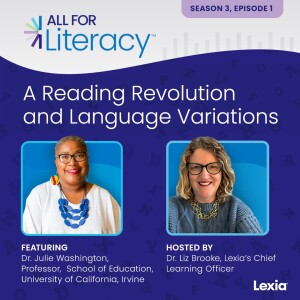
Tuesday Aug 06, 2024
Tuesday Aug 06, 2024
Host Dr. Liz Brooke and Washington kick off the new season of the All For Literacy podcast with a thought-provoking conversation about language variation and literacy rates. A professor in the School of Education at the University of California – Irvine, Washington shares her expertise about how dialect variation and density, code-switching, and translanguaging play into literacy assessment and success.
Learn ways to help students boost their literacy success through:
Using the full spectrum of their language skills
Adjusting mindset and prior expectations
Boosting comfort levels in the classroom
Adding dialect into teaching
Washington and Brooke also present a fascinating look into the syntax behind the reading wars, and whether or not “the reading revolution” is a more accurate label. Listeners will better understand how initial terminology can influence a society’s approach to solving or interacting with a concept.
Dr. Brooke kicks off the latest season of All For Literacy, and walk away with an in-depth look into how dialect and language interplay with literacy acquisition in the classroom. And as a bonus, use this related infographic to start a conversation within your learning community.
Episode Breakdown
(00:30) – What sparked Washington’s interest in literacy
(03:16) – How she sees her work translating into the classroom
(06:50) – Dialect vs. language variation
(10:03) – Relationship between code switching and translanguaging
(12:43) – Encouraging students to use their full spectrum of skills
(16:00) – Why students need to understand the purpose of the lesson
(21:00) – How language variation affects assessments
(27:10) – The reading revolution
(42:51) – What makes Washington hopeful for the future of literacy and language
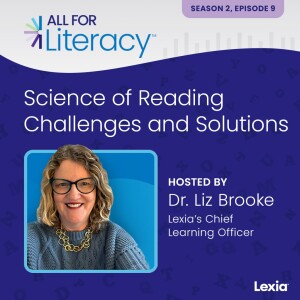
Tuesday Jun 18, 2024
Tuesday Jun 18, 2024
As Season 2 of All For Literacy® comes to a close, host Dr. Liz Brooke dives into the challenges and opportunities currently being explored by educators across the country. Featuring insightful clips from discussions with prominent educators, this episode drives home many of the ideas mentioned throughout this season.
Empowering teachers through professional development, evidence-backed resources, and accessible data is an important step in implementing the science of reading
The science of reading highlights the importance of teaching and connecting a multitude of skills
Dr. Sharon Vaughn identified the crucial importance of including literacy practice and intervention throughout a student’s day
Natalie Wexler emphasizes creating in-school assessments that honor all students and their access to content knowledge
A deep understanding of current challenges and opportunities is required to take action and increase student literacy success. Tune in for the final episode of Season 2 to better understand the current issues at the forefront of educators' minds.
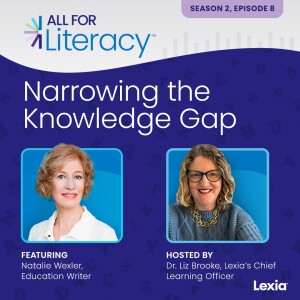
Tuesday May 07, 2024
Tuesday May 07, 2024
What would it take to narrow the knowledge gap between high-achieving and struggling students when it comes to reading and writing?
Education writer Natalie Wexler joins Host Dr. Liz Brooke in Season 2, Episode 8. Wexler is author of “The Knowledge Gap: The Hidden Cause of America’s Broken Education System—and How to Fix It.” Her writing focuses on content-centric education and charts possible routes to achieving educational and social equity.
Gain a critical understanding of how content-focused instruction improves student success. Wexler and Brooke break down the findings behind several in-classroom studies that have changed how certain curriculums approach instruction while providing actionable tips for ensuring every student has an equal opportunity to excel.
Explore the impact of content knowledge, including:
How teachers can assess if they are narrowing the knowledge gap
Why the science of reading is not just “more phonics”
How to combine reading comprehension and foundational skills to improve literacy skills
Why standardized reading comprehension tests are flawed
Listen to Episode 8 of All For Literacy® to understand how to narrow the knowledge gap, increase student literacy skills, and set up the classroom for equitable education.
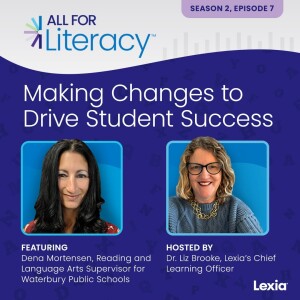
Tuesday Apr 16, 2024
Tuesday Apr 16, 2024
“There's nothing that's going to change student achievement more powerfully than the teacher, but it's very difficult for the teacher to do that job if they don't have support from leadership at the top,” Dena Mortensen, Ed.D. explains in Episode 7 of All For Literacy™.
Mortensen sits down with host Dr. Liz Brooke to discuss a boots-on-the-ground perspective about implementing the science of reading. An elementary reading and language arts supervisor for Waterbury Public Schools in Waterbury, Connecticut, Mortensen offers listeners a detailed look into how the school district is making changes to improve student literacy rates. Mortensen also discusses her involvement with the documentary “Hopeville: How to Win the Reading Wars,” directed and produced by All For Literacy Episode 6 guest Harvey Hubbell V.
Mortensen and Brooke explore how to:
Encourage teachers to adopt the use of progress-monitoring data
Make a dedication to evidence front and center
Repurpose balanced literacy and whole language materials
Support teachers as they learn about the science of reading
Make in-classroom coaching accessible to all
Explore the show notes for links to people and resources mentioned in the episode. Subscribe to All For Literacy today and never miss an episode.
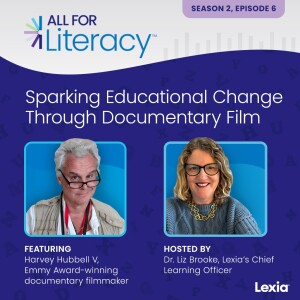
Tuesday Apr 02, 2024
Tuesday Apr 02, 2024
“This has been a long, crazy journey of me trying to figure out what the heck is going on with education,” says Emmy Award-winning documentary filmmaker Harvey Hubbell V in Season 2, Episode 6 of All For Literacy™.
Hubbell sits down with host Dr. Liz Brooke for an insightful look into how documentary films affect the educational system and the science of reading movement. His company, Captured Time Productions, has released several education-related documentaries, including “Dislecksia: The Movie” which focuses on the misunderstood subject of dyslexia, and “Hopeville: How to Win the Reading Wars,” which takes a never-before-seen look at the challenging process of learning to read.
Gain an in-depth understanding of how these documentaries fuel the greater literacy conversation, the critical choices made in each film to tell stories in digestible and impactful ways, and where the next need for advocacy is to make the most significant difference in the lives of students.
Tune into All For Literacy today to gain an exclusive look at Hubbell’s films, and subscribe to the podcast to never miss an episode!
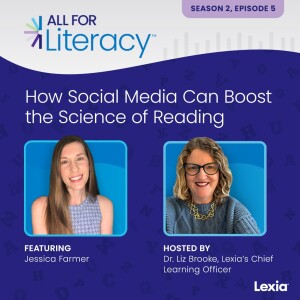
Tuesday Mar 19, 2024
Tuesday Mar 19, 2024
What role can social media play in advancing the science of reading movement?
Recorded live during Plain Talk About Literacy and Learning 2024 in New Orleans, host Dr. Liz Brooke sits down with literacy influencer Jessica Farmer to discuss how social media provides an effective platform for transferring data-backed practices to educators, administrators, and parents. A former first grade teacher, Farmer shares actionable activities and tips with more than 300,000 followers on her Farmer Loves Phonics accounts on Instagram, TikTok, Twitter, and Facebook.
Farmer shares how to:
Spot literacy misinformation on social media
Support teachers as they go through rigorous professional learning while also teaching
Use evidence-based practices at home with children
Make quick changes today in the classroom and see real results
Use social media to complement formal professional learning
In this special All For Literacy episode, listeners at the live recording had the opportunity to ask Farmer specific questions about the role of certain platforms in literacy education and enjoy memorable audience interactions.
Listen to Episode 5 to understand another side of the science of reading movement. And don’t forget to subscribe to All For Literacy and never miss an episode.




